How Comparison Culture Is Inadvertently Harming Our Lives
Identifying a problem through expert analysis and research so we can begin using Comparison Culture as a catalyst for growth and positive change.
By Andrea Miller
Written on Oct 13, 2023
Photo: Cottonbro Studio | Canva

There’s something we have to talk about. It’s pervasive, destructive, hidden in plain sight, and it’s very likely affecting your life, just as it has affected mine.
This sometimes damaging and dehumanizing force I am referring to can best be described as Comparison Culture.
What is Comparison Culture?
We are defining Comparison Culture as a societal phenomenon in which individuals habitually engage in the practice of constantly measuring themselves, their achievements, possessions, and life circumstances against those of others.
https://www.tiktok.com/embed/v2/7289058159002422571?lang=en-US&referrer=https%3A%2F%2Fwww.yourtango.com%2Fself%2Fcomparison-culture-research
It doesn’t just pervade and pervert social media. Comparison Culture spills over into our real lives in insidious, and — frequently — nearly invisible ways.
Personally, I have a lot of experience with Comparison Culture, the hurt and heartache that it engenders as well as the motivation it can spark. So I got curious about it. I conducted some research and asked some experts and some of you, our readers, about how it shows up in your lives.
From September 1 – 25, 2023, we conducted a survey that generated responses from 725 people from every state in the US and a handful internationally.
Some of the answers, like one from an anonymous survey respondent who noted that “Without Comparison Culture, I would have lived an authentic and honest version of myself… and probably wouldn’t have self-harmed or tried to end my life when I was younger,” were a punch in the face — a wake-up call to just how extreme the impact of comparison can be.
RELATED: You Were Born To Live A Life You Love, Not To Be Perfect
The YourTango Comparison Culture survey shows a pervasive problem.
- Nearly two-thirds (62%) of people indicated that it is super problematic or somewhat problematic in their lives.
- Worse yet: 79% of respondents stated that Comparison Culture is super or somewhat problematic in the lives of their kids or others with whom they are close!
- Only 38% said it is not problematic in their lives.
- And only 21% believe it is not problematic in the lives of those they are close to.
Whew. Those are some big numbers, and I feel quite a bit of concern about them.
Comparison Culture research also gives some unexpected glimmers of hope.
As heartbreaking and sincerely shocking as some of the answers were, let’s look at what is positive! I’m confident we can reshape the way we live with, view, and move through Comparison Culture.
Notice I didn’t say we can eliminate it. I don’t think that’s a healthy goal or really even possible, as “social comparison is a very natural human tendency originally articulated in psychology by Festinger,” explained Dr. Cortney Warren.
And, based on our research, it sounds like many of us find it beneficial sometimes. When comparing themselves to others, 75% say Comparison Culture motivates them to change in healthy ways.
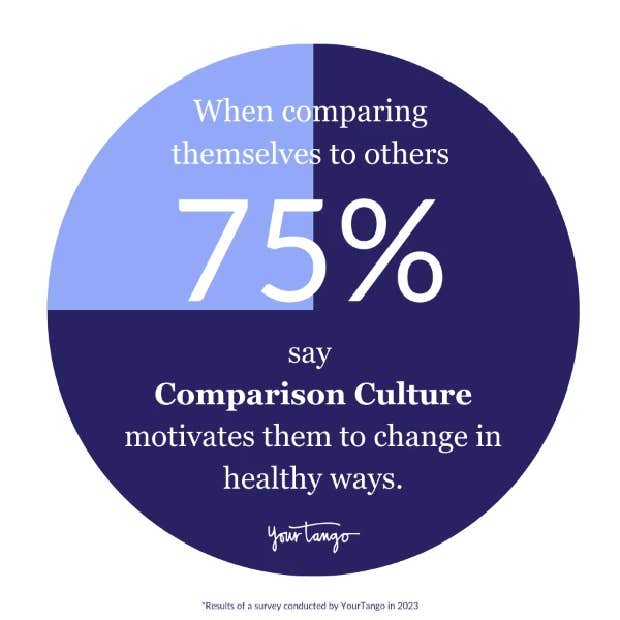
“What I think is important to highlight is that it is natural to compare yourself to others, and the consequences of those comparisons can be helpful/adaptive or harmful/maladaptive,” Dr. Warren added. “The goal is not necessarily to stop comparing (because I’m not sure that is a reasonable possibility) but to ensure that the way you compare yourself to others is accurate and helpful (as opposed to distorted or harmful).”
In fact, comparison can be helpful in the way it relates to motivation. As one anonymous survey respondent put it, “I think initially it can be a surprise that I’m even affected it, but then, normally, it helps me to be motivated to change the things that I would’ve been jealous about.”
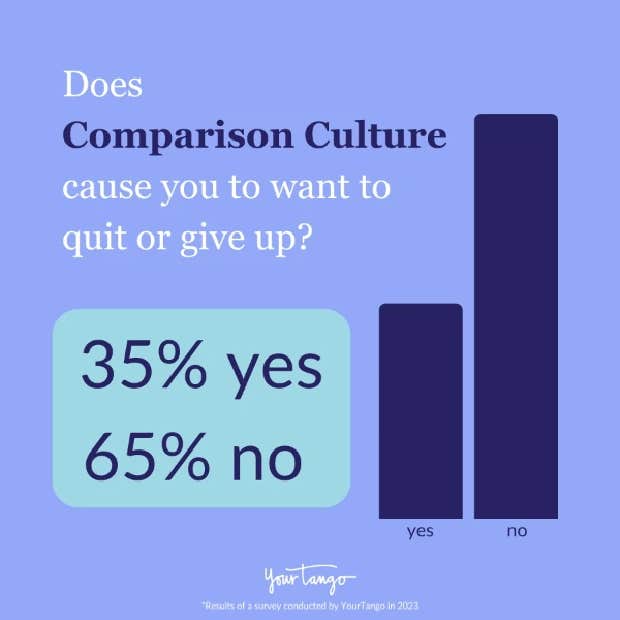
For competitive athletes, comparing yourself to a contender who is faster than you can be supremely motivating. For a business leader, student, or scientist, motivation can be found sometimes when we look at someone else’s work — someone who has been super creative and successful, or who has maybe achieved what was considered impossible.
RELATED: Want To Be More Comfortable In Your Own Skin? 4 Things You Haven’t Tried Yet
Comparison seems innate to human beings — and for good reason.
When we reached out to experts in fields related to psychology and brain science, their feedback was unequivocal in the natural and important role comparing has in the lives of human beings.
Dr. Liz Zed said, “Yes, Comparison Culture is biologically wired. We are judgmental by nature and compare in part due to mirror neuronal activity, brain neuroplasticity, and the very laws of nature, which include the law of polarity. One could argue that the very nature of our human existence is that we exist inside opposing poles — also known as contrasts. We get to choose from these contrasts on a moment-to-moment basis… How we choose between the two, determines which side of the pole manifests into the physical reality we are experiencing.”
“Comparison Culture is connected to our survival instinct. If we measure up or are superior, our chances of survival go up. It is a variant of Darwin’s Theory of Adaptation,” Dr. Harville Hendrix added.
Comparison Culture can also be harmful.
Nature and benefits aside, the comparison trap can be exhausting for many of us — sometimes to the extreme, causing us to feel plagued by doubt and to feel we’re just not good enough. The top three emotions people feel when comparing themselves to someone else on social media are inadequacy, jealousy, and sadness.
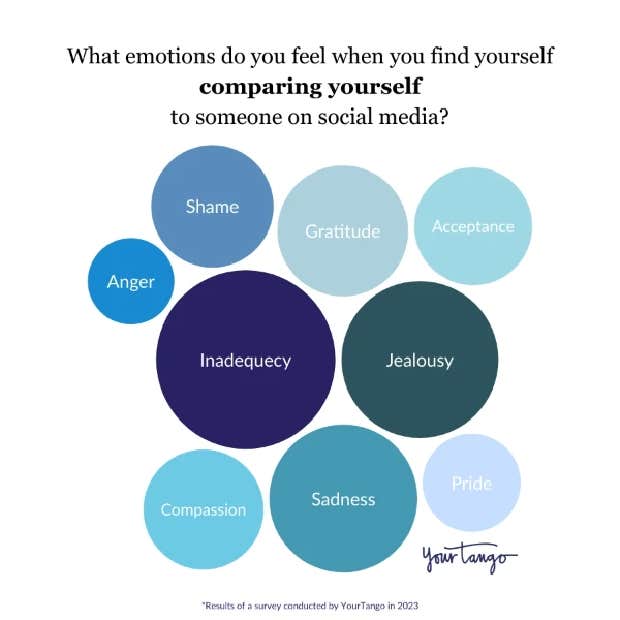
RELATED: 8 Useful Things To Do Instead Of Comparing Yourself To Others
For some, Comparison Culture is so forceful that they won’t even take the first step to venture out because they feel they are simply too far behind others to get started.
“Comparison Culture has motivated me to want to do better, and, at the same time, paralyzed me to take action because of feeling hopeless,” said one anonymous survey respondent.
Those of us regularly on social media platforms know how easy it is to slip into feeling less than when we observe others in our social circles appearing to have more fun, be happier, better looking, and more successful than we are. Comparison Culture frequently pulls us into a place of scarcity, where we not only feel plagued with doubt but also feel we don’t have and probably never will have enough.
At times, it can lead to very poor judgment. Many of our survey respondents felt comparing themselves to other people motivated them or others to make risky financial decisions. In fact, when it comes to money, 51% of survey respondents said one thing they compare the most to others is their finances.
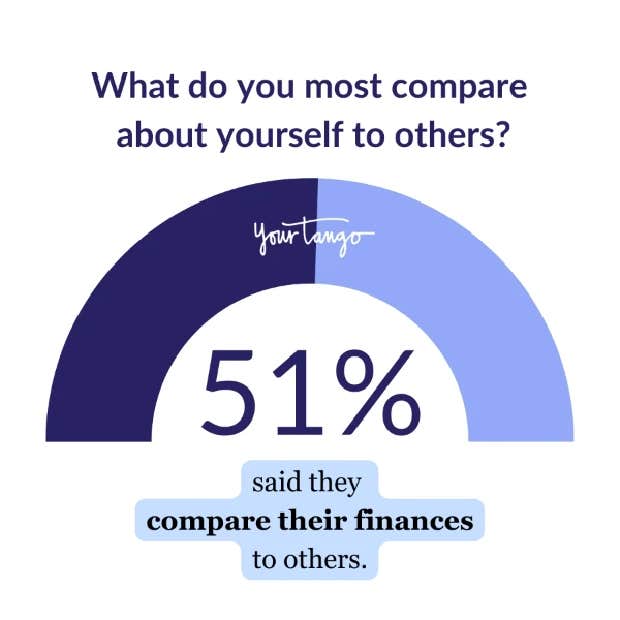
“I try to be frugal, save, and not get in debt, but I still find myself feeling inadequate when I see others my age with really great things,” an anonymous survey respondent admitted. “Many of my friends with so much more than me are drowning in debt; so I do feel we have kind of created a terrible culture of debt and it being ok because of comparison.”
Comparison Culture hurts kids.
Comparison Culture has become especially acute for teens and young adults, and what is extra alarming is how it is impacting children — meaning those under the age of 11.
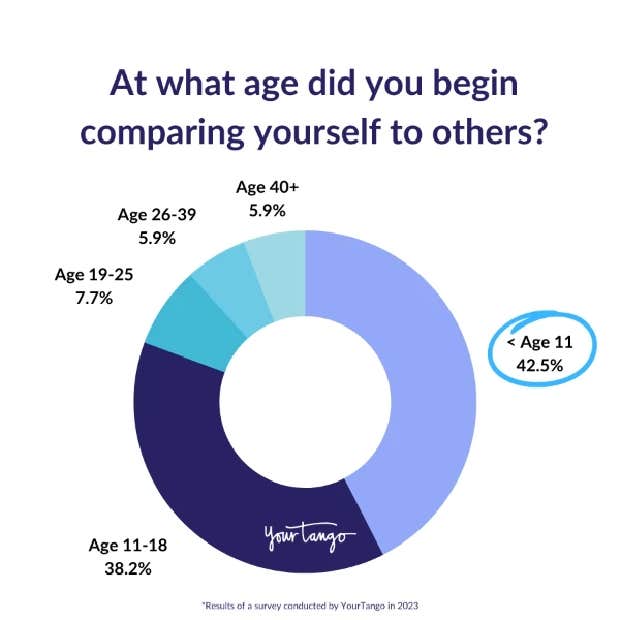
- Over 42% of survey respondents said they were younger than 11 when they first began to compare themselves to others.
- Over 38% said they were 11-18.
- Over 7% said they were 19-25.
- Nearly 6% said they were 26-39.
- Nearly 6% said they were over 40.
Young people are suffering, and I think we can presume they may even be dying from Comparison Culture. Suicide is the second leading cause of death in the United States for ages 15 to 24, according to the National Alliance on Mental Illness. We know there is a strong correlation between Comparison Culture and mental health: 73% of survey respondents link Comparison Culture with depression and other mental health challenges. From dealing with body image issues and social status to grades and other markers of fitness and achievement, 87% of respondents began to compare themselves to others by the time they were 24.
This all adds up to a troubling correlation. We can’t keep telling kids to just stop comparing yourself to others. It’s clearly more complex than that, and it’s so important we get this right.
RELATED: 5 Powerful Life Lessons Kids Learn When You Prioritize Your Own Mental Health
Comparison Culture is strongly linked to mental health issues.
I have long suspected Comparison Culture is a major culprit in the mental health crisis plaguing society and the results of our survey support this.
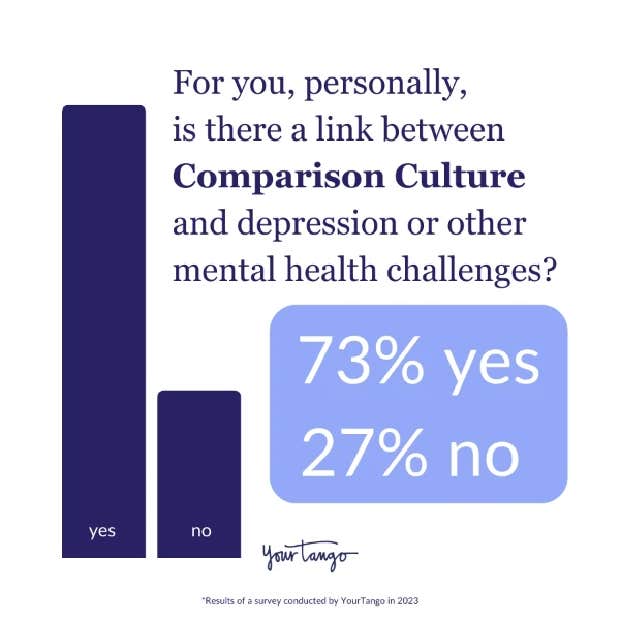
- 73% of respondents said there is a link between Comparison Culture and depression or other mental health challenges for themselves.
- 21% of respondents claimed they were comparing themselves to others in unhealthy ways daily!
- Another 25% said they were doing so up to three to four times per week.
I don’t often find myself in a comparison trap these days, but 1 in 5 respondents said Comparison Culture impacts them daily — and it can still be acute and even debilitating when I do.
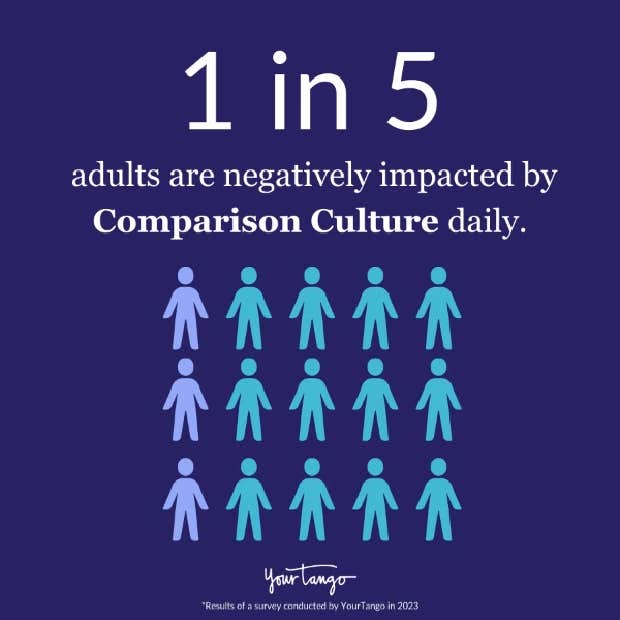
Here’s another heartbreaking quote from and anonymous survey respondent: “Because of Comparison Culture, feelings of inadequacy added to my drinking habits earlier in life. When I experience this, I often get suicidal, and no, it’s not helpful.”
Sentiments like this are what’s driving me to want to help people understand and manage this phenomenon better in their own lives — to know they’re not alone in this suffering. In our society, we strive to breed exceptionalism. Then we magnify it through social media platforms, the news media, in our families, schools, and communities. No wonder Comparison Culture is endemic. It’s woven into our culture, and, as citizens of that very culture, the vast majority of us have internalized it — often to our detriment.
Related Stories From YourTango:
We Asked You And Our Experts About Comparison Culture — The Results Are In And We’re Alarmed
The Astrological Reason Why Men Feel So Lonely Right Now
5 Ways To Stop Feeling So Lonely Almost Immediately
RELATED: 13 Tiny Things Pretty Much Anyone Can Do To Improve Their Emotional Health
Comparison isn’t new, but social media is.
It’s not shocking that over 71% of respondents feel social media is the largest contributor to Comparison Culture. Especially when we see that 89% of respondents feel the problem is worse compared to the last decade.
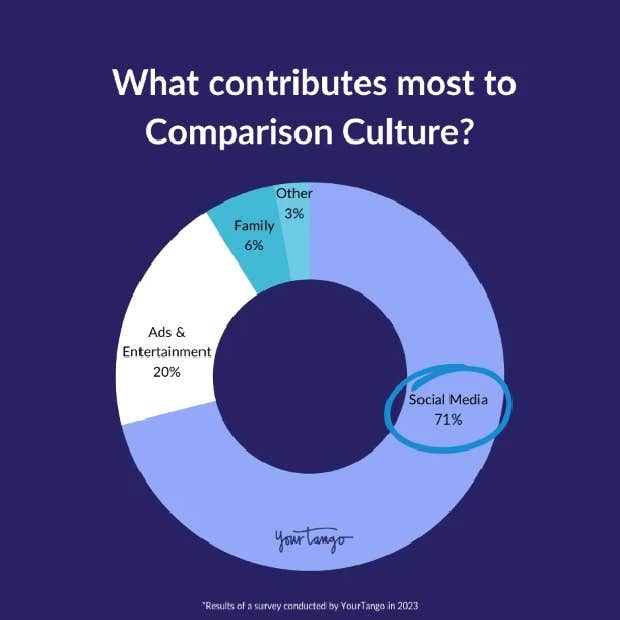
RELATED: Why We Need To Stop Filtering Our Lives On Social Media
“Comparison is the thief of joy,” — the quote you’ve likely heard more than once is attributed to President Theodore Roosevelt. Warnings about the perils of comparison go even further back — to the Bible.
2 Corinthians 10:12 “For we dare not class ourselves or compare ourselves with those who commend themselves. But they, measuring themselves by themselves, and comparing themselves among themselves, are not wise.”
Comparison is not a new phenomenon, but Comparison Culture is a rapidly worsening problem, which correlates directly with the ubiquity of social media.
“What we are experiencing today is learned behavior,” explained Life Coach Roland Legge. What is wired into us is the need to be in the community and build relationships with others. For millennia, people have compared themselves to others, but with social media, it has become toxic.”
Can we evolve with Comparison Culture?
What if we could learn to acknowledge how and why we are naturally compelled to compare ourselves to others, glean knowledge and empowerment from that, and change the way it impacts our lives?
What if we shifted from saying “Stop comparing yourself to others,” to “Comparing yourself to others is natural, and, if you keep these things in mind, comparison can help you improve your life”?
Let’s explore this as a pervasive phenomenon — that can sometimes be harmful and other times be helpful — and have these conversations out loud so far fewer of us struggle with the negative impacts in isolation. We can acknowledge this is a true cultural and even biological force, offer ways to think about and manage it more effectively, and hopefully use it as a catalyst for growth and positive change. After all, the research shows that it’s possible!
RELATED: How To Stop Comparing Yourself To Others & Seek Validation From Within
More for You:
The 3 Things People Immediately Judge You On When You First Meet Them
5 Immediate Signs Of A Toxic, Passive-Aggressive Person
7 Unsexy Habits That Demolish Your Likeability
10 Little Habits That Make You IRRESISTIBLY Attractive
Andrea Miller is the founder and CEO of YourTango; host of the podcast “Open Relationships: Transforming Together;” award-winning author of Radical Acceptance, The Secret to Happy, Lasting Love; a passionate relationship catalyst. She has been featured frequently in the media, including on The Today Show, The Early Show, CNN, E!, Fox News, ABC, and radio stations across the U.S.


